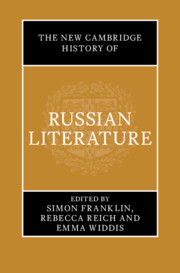Book contents
- The New Cambridge History of Russian Literature
- The New Cambridge History of Russian Literature
- Copyright page
- Contents
- Figures
- Contributors
- Acknowledgements
- On Transliteration, Names, and Dates
- Introduction
- History 1 Movements
- History 2 Mechanisms
- 2.1 The Monastery
- 2.2 The Court
- 2.3 The Salon and the Circle
- 2.4 The Thick Journal
- 2.5 The Publisher
- 2.6 Queerness
- 2.7 The Censor
- 2.8 The Voice
- 2.9 The Self-Publisher
- 2.10 The Market
- 2.11 The Internet
- 2.12 Empire
- Boxes 3 Places
- Boxes 4 Narrative Voices
- History 3 Forms
- History 4 Heroes
- Index
- References
2.6 - Queerness
from History 2 - Mechanisms
Published online by Cambridge University Press: 31 December 2024
- The New Cambridge History of Russian Literature
- The New Cambridge History of Russian Literature
- Copyright page
- Contents
- Figures
- Contributors
- Acknowledgements
- On Transliteration, Names, and Dates
- Introduction
- History 1 Movements
- History 2 Mechanisms
- 2.1 The Monastery
- 2.2 The Court
- 2.3 The Salon and the Circle
- 2.4 The Thick Journal
- 2.5 The Publisher
- 2.6 Queerness
- 2.7 The Censor
- 2.8 The Voice
- 2.9 The Self-Publisher
- 2.10 The Market
- 2.11 The Internet
- 2.12 Empire
- Boxes 3 Places
- Boxes 4 Narrative Voices
- History 3 Forms
- History 4 Heroes
- Index
- References
Summary
This chapter provides an overview of the longue durée of Russian literature’s engagement with non-heteronormative sexuality and non-normative genders as well as a more extended focus on the Modernist period as a time when queerness operated as a particularly generative cultural mechanism, stimulating new modes of literary production. While queer literary expression can be observed since the beginning of literature in Russia, the chapter argues that the early twentieth century saw the development of specific forms of literary poetics that were at once expressive of queerness and associated with it. The chapter also considers the history and philosophical connections of the most significant of these forms: the existential prosaic fragment.
Keywords
- Type
- Chapter
- Information
- The New Cambridge History of Russian Literature , pp. 313 - 332Publisher: Cambridge University PressPrint publication year: 2024

